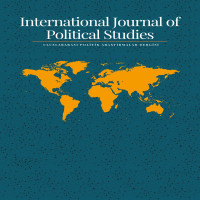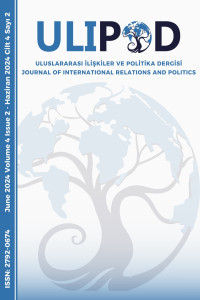Research Articles
Issue Reviewers

 0000-0001-7339-2680
0000-0001-7339-2680






Aim & Scope
The Journal of International Relations and Politics (ULIPOD); It aims to contribute to the literature by preparing non-profit, free, accessible, double-blind peer-reviewed studies in the fields of International Relations and Political Science, which are in the public interest. In addition to original articles in the field, book and article reviews are also published in our journal.
The Journal of International Relations and Politics (ULIPOD); In line with the determined purpose, it publishes articles, book reviews and book reviews on subjects falling within the scope of international relations, international politics, political history, international law, terrorism and security studies, regional studies, migration studies, diplomacy, political economy, foreign policy and political science.
Author Guidelines
Editorial Principles
1. There is no evaluation fee and application fee for the articles submitted to the journal.
2. There is no royalty payment to the author (s) for the works published in the journal.
3. Compliance with the spelling and punctuation rules in the articles to be sent to the Journal of International Relations and Politics (ULIPOD) is one of the most important issues.
4. The citation and reference order of the articles to be sent to the Journal of International Relations and Politics (ULIPOD) should be made in accordance with APA.
5. Manuscripts submitted to the Journal of International Relations and Politics (ULIPOD) should not have been published anywhere before and have not been presented for publication.
6. Articles should be written in Turkish or English. The responsibility of the studies published in the journal in terms of science and language belongs to the author (s).
7. In our journal, not only studies from academics but also studies from researchers and practitioners will be evaluated.
8. The articles should be prepared by filling the article template on the spelling rules page, and saved in .docx format, and uploaded to the system.
9. Articles, first of all, will be evaluated by our Editorial Board at the pre-control stage, and articles that contribute to the literature in terms of their scientific content will be included in the refereeing process.
10. Articles sent to our journal are sent to at least two referees after preliminary examination in terms of form and content and scanned in the plagiarism program. Articles with positive opinions from the referees are taken into the publishing process. If one positive and one negative report is received from the referees, the study is sent to a third referee if deemed appropriate by the Editorial Board. Referee appointments are made by the editorial board.
11. Articles submitted for publication in the journal should be prepared in accordance with the rules of research and publication ethics. In studies requiring ethics committee approval, information about the permission (name of the board, date, and number) should be included in the method section and also on the first/last page of the article. In the case of reports, the information that the informed consent/consent form was signed should be included in the article. Therefore, articles that do not send this document although the ethics committee requires a permit will not be evaluated and will be rejected.
12. The publication time and the number of articles of which the evaluation process has been completed are determined by the Editorial Board. For articles accepted for publication, an acceptance e-mail is sent to the author (s) via DergiPark.
13. The evaluation process has been completed and the articles can be published with the opinion of the editorial board within a maximum of 3 issues following its acceptance.
14. In line with the reports from the referees, it is decided to publish the article, to request the correction, additional information, and abbreviation from the author (s) within the framework of the report or not to publish, and this decision is notified to the author (s) through the system. The author (s) are obliged to make all changes requested by the referees. If the authors do not make the requested changes within the specified period, their articles are returned.
15. Published articles can be used in accordance with our Open Access Policy and Creative Commons license provided that the source is indicated.
16. The information and responsibility in the articles published in the journal belong to the authors.
17. The originality of the studies is one of the most important issues. For this reason, salt literature survey etc. studies are not included in our journal.
18. If the research subject and article have been supported by any institution or if the article is from the thesis, this should be stated in the file of the author's information.
19. Applications for articles that do not comply with publication principles will not be accepted. The evaluation process of the articles whose deficiencies are detected later will be terminated regardless of the stage and the article will be rejected.
20. Authors can archive their articles via Sherpa/Romeo, Dulcinea, Diadorim etc. systems.
Writing Rules
Headings in the article
The article should have both Turkish and English titles. The title should be written in Book Antiqua font, 12 pt, single-spaced and justified. The Turkish title should be written first, followed by the English title. The internal headings in the article should be written with the first letters capitalized and bold, justified, and numbered. Subheadings should be numbered systematically. Abstract, Abstract, Introduction and Conclusion should be written without numbering.
Author(s) Information
When the referee process is completed, the author should first write the title of the article in Turkish and English in accordance with the title format. Then, one line below the title, the name and surname of the author(s) should be written in Book Antiqua, 11 pt, bold, right justified, 1.5 line spacing. The title, place of work, e-mail address, ORCID number of the author(s) should be given as a footnote (9 pt. / Book Antiqua). Footnotes for other explanations should be numbered in the text and at the bottom of the page.
Abstract
After the author's name, there should be a Turkish and English abstract (maximum 250 words) expressing the scope and originality of the article. Under both abstracts, there should be 3-5 keywords expressing the scope of the text. It should be written in Book Antiqua, 10 Punto, 0 pt before and after, single-spaced. For articles written in a foreign language, an abstract in Turkish is also required.
Font and Page Layout
In the works prepared as MS Word file, Book Antiqua font should be used in the form of 1.25 cm inside the paragraphs, 12 pt, justified, 6 nk space before and after paragraphs, single line spacing. Manuscripts should not exceed 10,000 (ten thousand) words, excluding abstract and bibliography.
Sections
In the introduction section, the hypothesis and scope of the article should be emphasized. In the development section, the introduction should be supported by data, opinions, comments and discussions with intermediate and subheadings. In the conclusion section, the results reached in the article should be explained by supporting them with recommendations.
Table, Figure and Visual
Figures, pictures, graphs and tables should be numbered. Figure, picture and graphic names should be underneath; table name should be above the table. The text and numbers in figures, pictures, graphics and tables should be written in 10 point font.
Graphics should be openable in Windows MS Word and graphics and tables should be numbered. Tables, figures, pictures and charts should be of a size appropriate to the page of the journal. If necessary, they can be written in smaller font size and single-spaced. Photographs should be in .jpeg format, of adequate size, and in the relevant places in the text.
Citation and References
APA 6th edition format and in-text citation method should be used. Direct quotations in the text should be written in quotation marks and italicized. Block quotations should start 1 cm from the right and left and should be written in 10 pt, italicized and in quotation marks using single line spacing.
For in-text citations, the reference system in which author's surname, date and page numbers are given should be preferred (Example: İnalcık, 1997: 53). In references to sources with more than two authors, the surname of the first author and the phrase "et al." should be used (Example: Morgan et al., 1994: 75). If more than one source is used within the same parenthesis, the sources should be separated by semicolons (;) (Example: Hassard ve Parker, 1994: 125; Boje, 1996: 146). The same rule should be followed for in-text citations in compilations and editorial books (consisting of articles). In encyclopedia and law articles, the name of the publication, year and number of pages should be given (Example: Meydan Larousse, 1998: 1256; Türk Medeni Kanunu, 2015: 124). In quotations from a study published by the same author in the same year, the quotations should be separated as a and b. (Example: Kazgan, 2016a: 125; Kazgan, 2016b: 256).
Explanations about some issues that need to be explained in the text can be given in the form of footnotes and such footnotes must follow each other numerically. However, references cannot be given as footnotes or endnotes.
Bibliography Writing Rules
Books
Alkin, E. (1988). İktisadi Giriş, 4. Baskı, İstanbul: Kanaat Matbaası.
Tabakoğlu, A. (2016a). Türk Malî Tarihi, İstanbul: Dergâh Yayınları.
Tabakoğlu, A. (2016b). Türk İktisat Tarihi, İstanbul: Kitabevi Yayınları.
Kazgan, G. (1989). İktisadi Düşünce veya Politik İktisadın Evrimi, İstanbul: Remzi Kitabevi.
Wood, R.; Payne, T. (1998). Competency-Based Recruitment and Selection, London: Wiley Publication.
Noondy, R.; Noe, M.; Premeaux, S. R. (2002). Human Resource Management, 8th Ed., New Jersey: Prentice-Hall.
Collected Books and Encyclopedias
Toynbee, A. (2000). "Osmanlı İmparatorluğu'nun Dünya Tarihindeki Yeri", (Ed. K. Karpat), Osmanlı ve Dünya, İstanbul: Ufuk Kitapları: 49–67.
Pamuk, Ş.(2010a). “Monetary History of the Ottoman Empire”, Journal of Economic History, Vol. 15, No. 12: 256–285.
Pamuk, Ş. (2010b). “İstanbul’da 500 Yıllık Enflasyon ve Fiyatlar”, Financial Economic History of Ottoman Empire, (Ed. B. McGowan), Cambridge University Press: New York: 125–138.
Friedman, M. (2000). “Just Price in Medieval Europe”, Britannica, C. 9, Cambridge University Press: London: 1245–1249.
Britannica (2016). “Price Competition”, C. 12, Oxford University Press: USA: 2345–2350.
Articles
Paskaleva, V. (1967). "Osmanlı Balkan Eyaletlerinin Avrupalı Devletlerle Ticaretleri Tarihine Katkı 1700–1850", İÜ. İktisat Fakültesi Dergisi, C. 27, S. 1–2: 48–59.
İnalcık, H. (1967a). “Osmanlılarda Riyaset Rüsumu”, Belleten, Ankara: TTK. Yayınevi: 258–260.
İnalcık, H. (1967b). “Capital Accumulation of Ottoman Empire”, Journal of Middle Eastern Studies, Vol. 28, No. 13: 128–135.
Linch, T.; Calantona, J. (1998). "The Impact of Market Knowledge Competence on New Product Advantage: Conceptualization and Empirical Examination", Journal of Marketing, Vol. 61 No. 2: 13–29.
Newspaper and Law Books and Texts
Akat, A. S., “Türkiye Ekonomisinin Yirmi Yıllık Geleceği”, Dünya Gazetesi, 22 Nisan 2012: 14.
Dünya Gazetesi, “İhracatta Rekor Gelişme”, 17 Ocak 1998: 7.
TBMM, Meclis Tutanakları, 28 Mayıs 2010: 1458.
Türk Ticaret Kanunu, 2014, Mad. 15.
T.C. Anayasası, 2014, İkinci Baskı, Başbakanlık Matbaası, Mad. 95.
Internet Resources
Salmon, P. (2003). "Decentralization and Supranationalty: The Case of the European Union", http://www.imf.org/external/pubs/fiscal/salmon.pdf, (Erişim: 02.10.2003).
"Special Topic: Corporate İncome Taxation and FDİ in the EU-8", http://siteresources.worldbank.org/İNTLATVİA/Resources/QER3spec.doc,(Erişim:28.10.2004).
http://www.tcmb.gov.tr, (Erişim: 28.10.2004).
Ethical Principles and Publication Policy
Price Policy
No fee is charged from the author or institution under any name.
Licensed under a Creative Commons Attribution-NonCommercial 4.0 International License.
Studies submitted to our journal are scanned by Turnitin.

